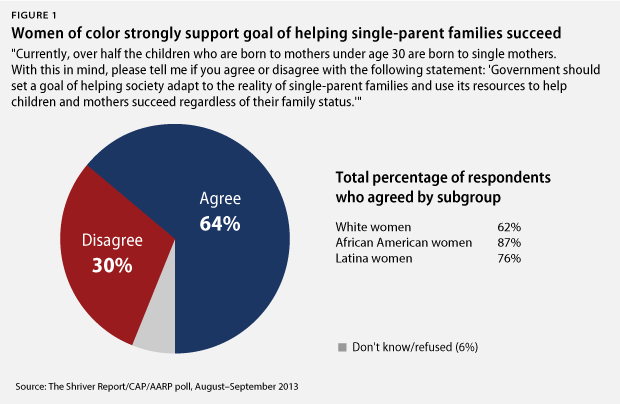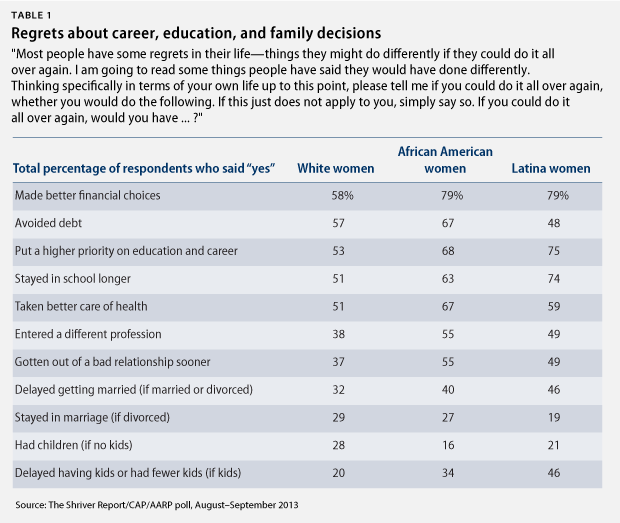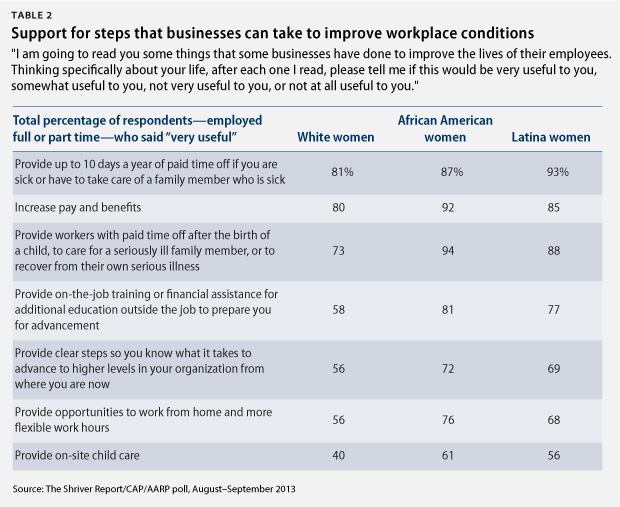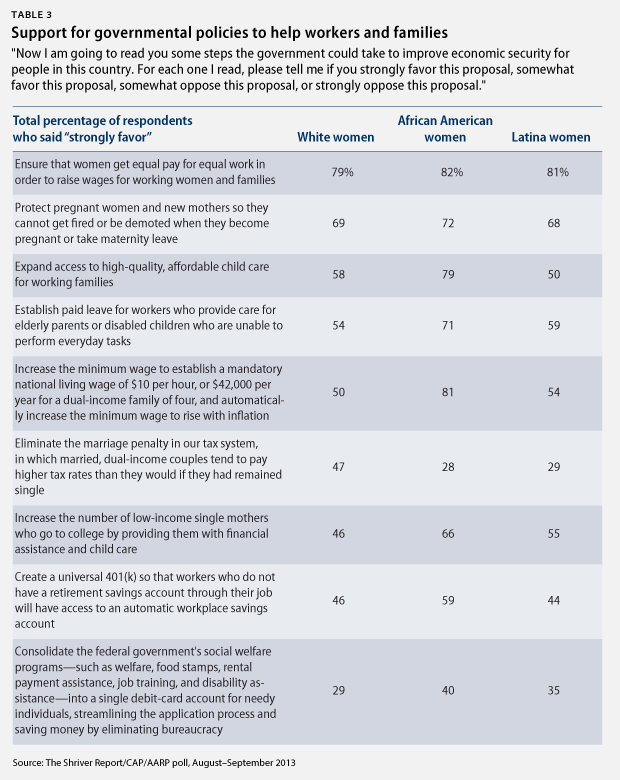In order to better understand public attitudes and beliefs about women and the economy, A Woman’s Nation Foundation, in conjunction with the Center for American Progress and AARP, commissioned a large national survey of 3,500 Americans to accompany the 2014 edition of The Shriver Report: A Woman’s Nation Pushes Back from the Brink. The bipartisan poll was designed and conducted by Greenberg Quinlan Rosner Research and TargetPoint Consulting and includes significant oversamples of African Americans and Latinos allowing us to look deeper into the attitudes of these important groups of women, as well as make comparisons across these groups.
Overall, our poll finds that African American and Latina women are among the strongest supporters of new steps by employers and governments to help women better adapt to changing family and workplace structures. Facing more difficult economic realities than many other Americans, women of color overwhelmingly desire increased economic opportunities, more flexibility at work, and back legal changes to ensure that women and workers are able to contribute fully to their families and to the national economy.
The overall survey results are described in detail in the full report. The most important findings from the African American and Latino oversamples include:
Women of color face more serious economic challenges than do white women but express greater optimism about their own futures. The overall economic situation for women of color is quite difficult. Forty-three percent of African American women and 45 percent of Latina women report annual family incomes of less than $40,000 per year, compared to about 3 in 10 white women, or 31 percent. Although women in general are more likely to live in two-income households than in one-income ones—47 percent of women live in two-income households, while 31 percent live in one-income households, with the remainder either retired or otherwise not employed—women of color are far more likely than white women to say that they could not get by without two-incomes: 57 percent of African American women and 59 percent of Latina women say this, compared to 45 percent of white women. Forty-two percent of African American women and 39 percent of Latina women also believe that the statement, “The harder I work, the more I fall behind,” describes them well, compared to only 30 percent of white women and 28 percent of Americans overall. Similarly, African American women are more than twice as likely as white women to report being unsatisfied with their jobs—22 percent versus 9 percent, respectively.
Reflecting the difficult economic prospects facing many women of color, majorities of both African American and Latina women—55 percent and 53 percent, respectively—report having received some form of government benefits in the past year including nutrition assistance, unemployment benefits, Medicaid, state children’s health insurance benefits, or reduced-price school lunches. In contrast, only 19 percent of white women report having received government assistance.
Despite these differences in more objective economic pressures, women of color express greater optimism about their own situations and experience less stress than do white women. For example, 83 percent of African American women and 74 percent of Latina women expect that their financial situation will get better over the next five years compared to only 52 percent of white women. More than 6 in 10 African American women—67 percent—and Latina women—62 percent—say that the statement, “I believe I have the ability to make significant changes in my life to make my life better,” describes them well, compared to only 47 percent of white women. Perhaps as a result of this increased confidence about the future, women of color report lower levels of stress than do white women. A full 50 percent of white women say they are stressed these days compared to majorities of African American women and Latina women that report not feeling that stressed. Fifty-eight percent of each group, respectively, report stress levels below neutral on a 0-to-10 scale.
Women of color overwhelmingly want society to adapt to the realities of contemporary family structures. Nearly 9 in 10 African American women—87 percent—and more than three quarters of Latina women—76 percent—agree with the statement, “Government should set a goal of helping society adapt to the reality of single-parent families and use its resources to help children and mothers succeed regardless of their family status.” Although agreement with this concept is strong across groups—64 percent among Americans overall and 62 percent among white women—women of color show the strongest preferences for government policies designed to help today’s families as they actually exist. Latina women, however, appear more conflicted than other women about how best to deal with these family changes. Sixty-seven percent of Latina women also agree that, “Government should set a goal of reducing the number of children born to single parents and use its resources to encourage marriage and two-parent families,” compared to only 45 percent of African American women and 47 percent of white women.

Women of color are more likely than white women to express regrets about their own decisions regarding family, work, and education. The poll asked respondents whether they had any regrets about a range of decisions in life and whether they would choose to do things differently if they had the chance. In general, African American and Latina women are more likely than white women to say that they would have delayed family decisions around marriage and kids and focused more on their own education and career choices. Forty percent of married or divorced African American women and 46 percent of Latina women would have “delayed getting married” compared to 32 percent of white women. Likewise, 34 percent of African American women and 46 percent of Latina women would have “delayed having kids or had fewer kids” if they could do it all over again compared to only 20 percent of white women. Fifty-five percent of African women and 49 percent of Latina women say they should have “gotten out of a bad relationship” sooner, compared to 37 percent of white women. Interestingly, African American men express similar attitudes with 51 percent of black men saying they should have delayed marriage and 33 percent saying that they should have delayed having kids or had fewer kids.
What would these women have done instead? Sixty-eight percent of African American women and 75 percent of Latina women say that they should have “put a higher priority on [their] education and career”; 53 percent of white women say the same. Roughly similar proportions of women of color also believe they “should have stayed in school longer”—63 percent of African American women and 74 percent of Latina women.

Women of color strongly believe that employers and governments need to provide greater economic opportunities for workers and more flexible work-life arrangements for families. African American and Latina women are some of the strongest supporters of concrete changes to workplace structures and governmental policies to help women and workers achieve more secure and stable lives. Looking at seven different things businesses have done to improve the lives of their employees, huge majorities of women of color say each of these changes would be very useful to them. For example, 87 percent of African American women and 93 percent of Latina women say that businesses providing up to 10-days of paid sick leave would be very useful to them, compared to 81 percent of white women. Seventy-six percent of African American women and 68 percent of Latina women say it would be very useful for employers to provide more opportunities to work from home and more flexible hours; 56 percent of white women agree. Sixty-one percent of African American women and 56 percent of Latina women would find on-site child care very useful, compared to 40 percent of white women.

Moving to governmental policies, women of color are strongly supportive of measures to ensure equal pay, end pregnancy discrimination, increase the minimum wage, increase child care support and paid leave for care giving, and expanded access to college. Examining the table below, African American women are the strongest supporters of these policy changes with intense support roughly proportionate among white and Latina women. Anywhere from 59 percent to 82 percent of African American women strongly support each of these measures with 46 percent to 79 percent of white women and 44 percent to 81 percent of Latina women strongly supporting these policies.

****
These findings are based on 3,500 total interviews conducted by landline and mobile telephone from August 21 through September 11, 2013. They include 1,097 white women and 665 women of color—specifically, 322 African American women and 252 Latina women. Telephone numbers were chosen randomly and in accordance with Random Digit Dial methodology. The sample was adjusted to Census proportions of sex, race or ethnicity, age, and national region.
The margin of sampling error for adults is plus or minus 1.7 points. For smaller subgroups, the margin of error is higher. Survey results may also be affected by factors such as question wording and the order in which questions were asked. The interviews were conducted in English and Spanish.
Full survey results by race and gender can be found here.
Read the executive summary for The Shriver Report here.